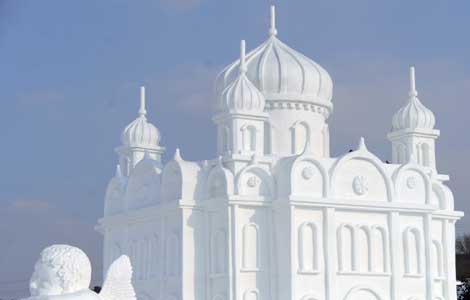Ground control to Major Tang
Updated: 2014-01-13 00:26
By DU JUAN (China Daily)
|
||||||||
Rich Chinese tourists looking to space for their next trips
If everything goes well, the first private astronauts from China may journey to space before the end of the year.
The Netherlands-based space tourism firm Space Expedition Corporation, or SXC, has signed an agreement with Dexo Travel, a domestic travel agency, to take rich Chinese to space.
Zhang Yong, chief executive officer of Dexo Travel, told China Daily that more than 100 people have expressed an intention to book space trip tickets since registrations began on the Chinese mainland on Dec 27.
Registration is for the Lynx Mark I spacecraft, which is expected to launch at the end of 2014, and the Lynx Mark II spacecraft, expected to begin flights in 2015.
Zhang revealed that two businessmen have already bought tickets for trips in 2015.
"The money is not a problem for the rich," said Zhang.
Alex Tang, chief executive officer of SXC Asia, said, "We have great confidence in the Asian market because of China's huge enthusiasm for space."
He said China's big achievements in space exploration in recent years have led to an increasing interest in outer space in the country.
Zhang said, "Going into space is no longer just for billionaires."
Of the more than 500 people who have gone into space, only a few have been private astronauts.
According to the company, a tourist will pay a minimum of $95,000 to board the Lynx Mark I spacecraft, which is produced by the US private aerospace company XCOR Aerospace.
The spaceship can only carry one astronaut and one tourist, who sits in the co-pilot seat.
The tourists will reach outer space about five minutes after takeoff.
The craft will stay in space for five to six minutes while the tourist can enjoy a view of space and one-third of Earth.
"The whole trip will last for one hour and there will be six minutes for the tourist to experience the condition of weightlessness," he said.
The Lynx Mark I spacecraft, which is designed to take participants to a height of 60 km, is expected to start flights by the end of this year.
The Lynx Mark II spacecraft is expected to begin flights in 2015 and will take participants into space to a height of 103 km, said Zhang.
Guo Hui, chairman of Chengdu Universal International Travel Service, is one of Zhang's marketing partners for the project.
He said five entrepreneurs in Chengdu, Sichuan province, have booked space trips.
However, it seems they are not going to space merely because of their interests in outer space, according to Guo.
"They decided to fly to space for the honor of their companies," he said. "There are many ways to enhance their companies' reputation, but there is only one chance to be China's first company owner who went to space."
According to Tang, SXC allows astronauts to show their company logo on their spacesuit.
However, at least one space fan said the trip wouldn't interest him because of its short length.
"If I go to space, I hope to stay at least one day there, experiencing dining, sleeping and going to the bathroom in the condition of weightlessness," said Yun Yi, 30, an IT engineer who has enormous interest in extraterrestrial life and science fiction.
"For real space enthusiasts like me, we want deep space rather than a slice of it. A height of 103 km is not enough for experiencing real space."
In the face of such comments, Tang said the company is providing outer space experience at an affordable price.
"The five to six minutes of space experience makes space more accessible to the public as there's much less safety risk, health concerns and physical training," he said.
A tourist who tries to fly more than 200 km has to pay at least 20 to 50 times the current price. Meanwhile, the stiffer requirements may eliminate at least 80 to 90 percent of potential clients, Zhang said.
- Official: China's space policy open to world
- China probes space deals
- Space trips open to Chinese travelers
- China providing space training
- Space trip to be offered in China for $220,000
- US space tourist blasts off for second space trip
- Chinese businessmen plan space trip
- Chinese business people booked on space trip

 Cristiano Ronaldo wins FIFA best player award
Cristiano Ronaldo wins FIFA best player award
 Xuelong carries on mission after breaking from floes
Xuelong carries on mission after breaking from floes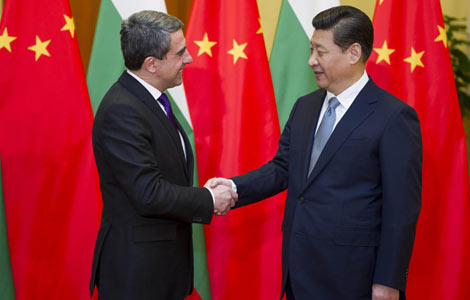
 Beijing and Sofia vow new initiatives
Beijing and Sofia vow new initiatives
 71st Golden Globe Awards
71st Golden Globe Awards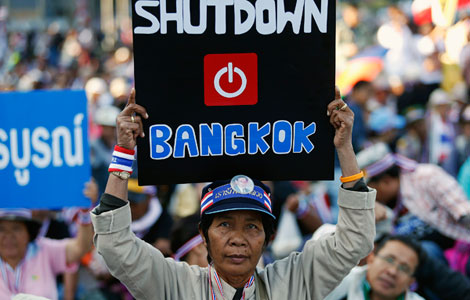
 Bangkok unrest hurts major projects and tourism industry
Bangkok unrest hurts major projects and tourism industry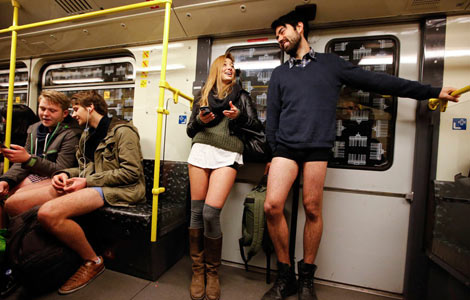
 No pant for cold subway ride
No pant for cold subway ride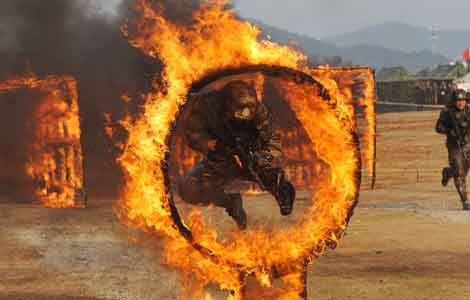
 Tough army training turns boys into men
Tough army training turns boys into men
 Blaze prompts concern for ancient buildings
Blaze prompts concern for ancient buildings
Most Viewed
Editor's Picks

|

|

|

|
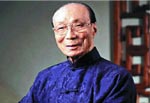
|

|
Today's Top News
Jackson's family bid for new trial denied
Newspapers must change or die
Abe’s brother to explain shrine visit to US
Protests cannot end Thai deadlock: observers
Mercy killing still a hot button issue
China builds army 'with peace in mind'
UN plea made on war victims
Li: China's tech innovation a priority
US Weekly

|

|


